英语五年级下广州版《Module1 Unit1What Does Sue Do on Weekdays》课件4
文档属性
| 名称 | 英语五年级下广州版《Module1 Unit1What Does Sue Do on Weekdays》课件4 | 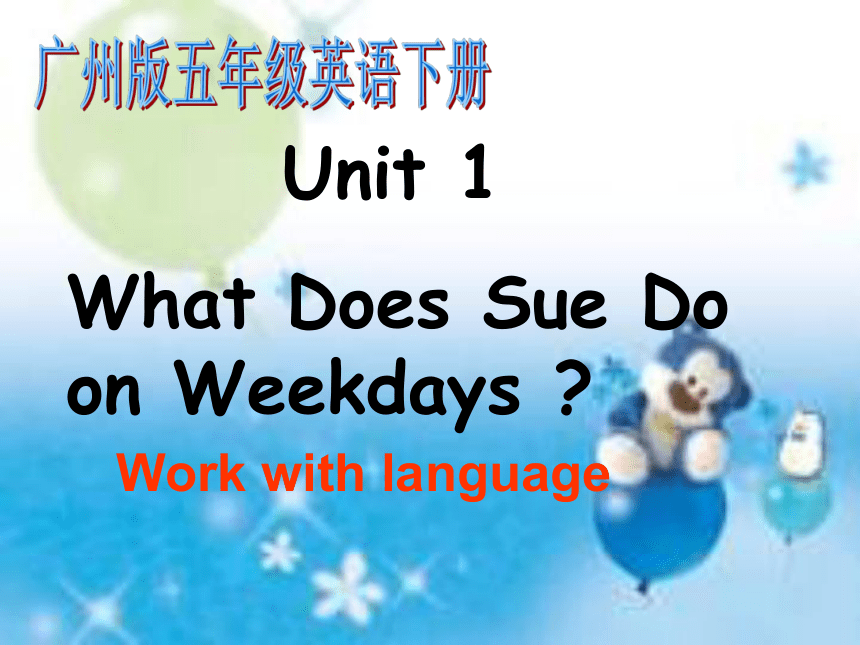 | |
| 格式 | zip | ||
| 文件大小 | 350.9KB | ||
| 资源类型 | 教案 | ||
| 版本资源 | 广州版 | ||
| 科目 | 英语 | ||
| 更新时间 | 2013-03-28 22:38:38 | ||
图片预览

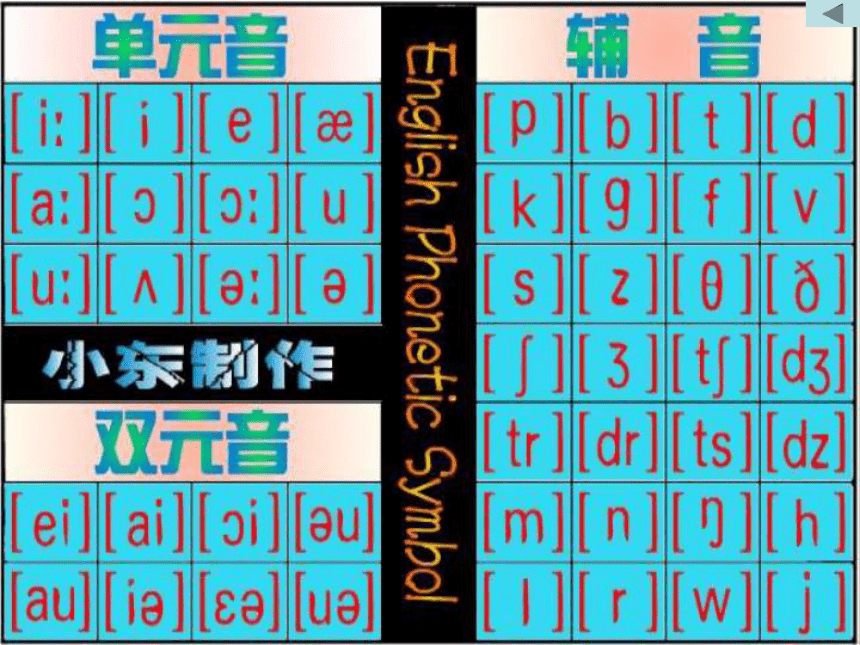
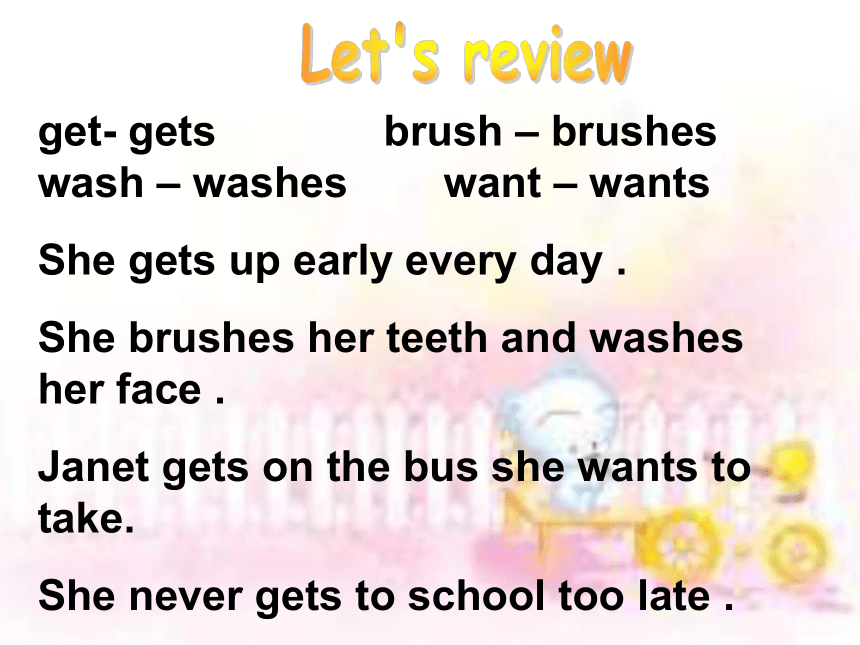
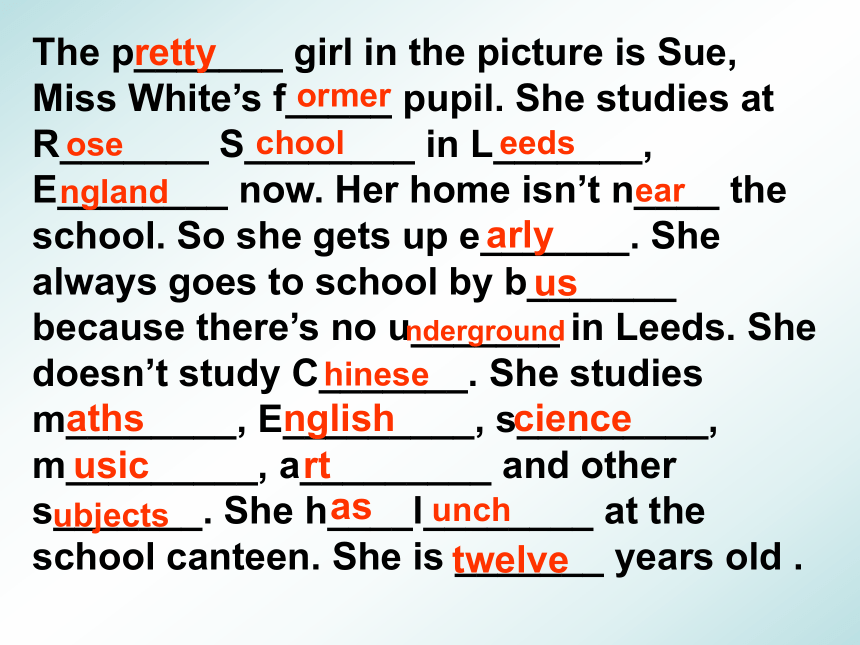
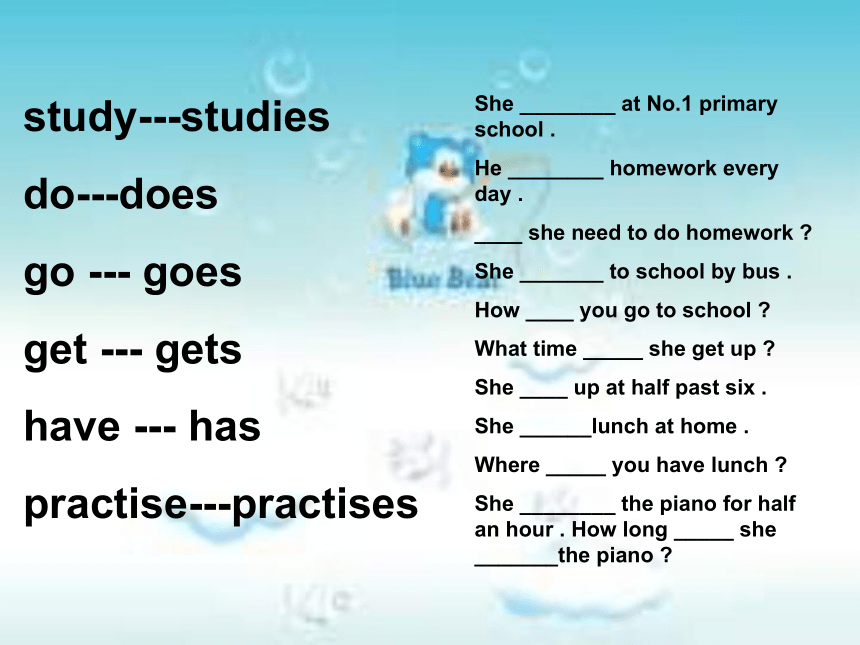
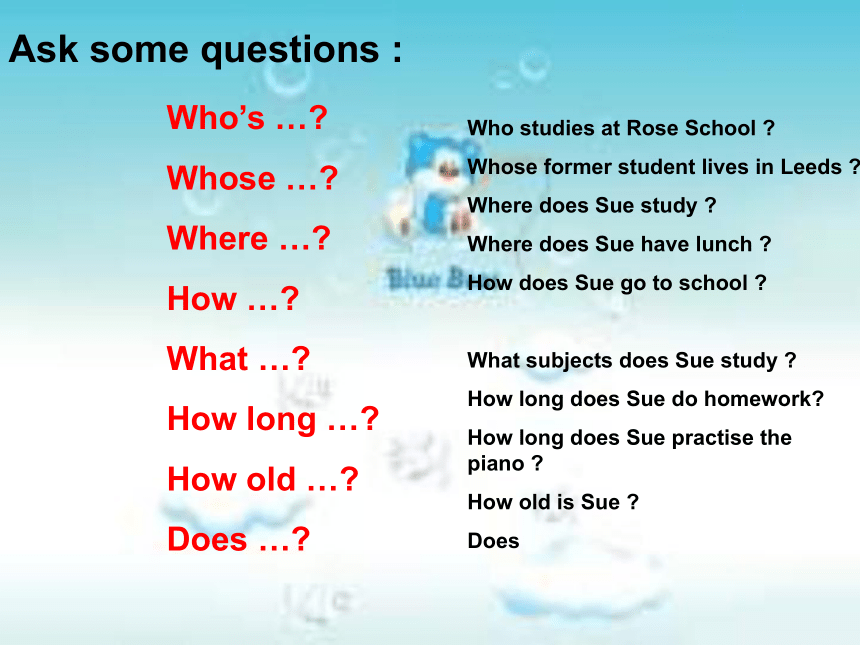
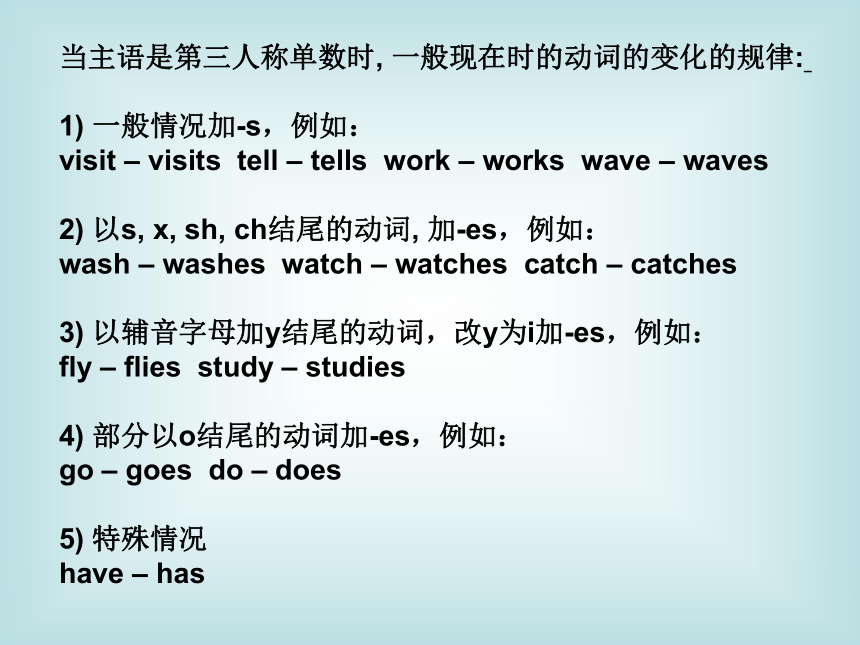
文档简介
(共17张PPT)
Unit 1
What Does Sue Do on Weekdays
Work with language
get- gets brush – brushes wash – washes want – wants
She gets up early every day .
She brushes her teeth and washes her face .
Janet gets on the bus she wants to take.
She never gets to school too late .
The p_______ girl in the picture is Sue, Miss White’s f_____ pupil. She studies at R_______ S________ in L_______, E________ now. Her home isn’t n____ the school. So she gets up e_______. She always goes to school by b_______ because there’s no u_______ in Leeds. She doesn’t study C_______. She studies m________, E_________, s_________, m_________, a_________ and other s_______. She h____l________ at the school canteen. She is _______ years old .
retty
ormer
ose
chool
eeds
ngland
ear
arly
us
nderground
hinese
aths
nglish
cience
usic
rt
ubjects
as
unch
twelve
study---studies
do---does
go --- goes
get --- gets
have --- has
practise---practises
She ________ at No.1 primary school .
He ________ homework every day .
____ she need to do homework
She _______ to school by bus .
How ____ you go to school
What time _____ she get up
She ____ up at half past six .
She ______lunch at home .
Where _____ you have lunch
She ________ the piano for half an hour . How long _____ she _______the piano
Who’s …
Whose …
Where …
How …
What …
How long …
How old …
Does …
Who studies at Rose School
Whose former student lives in Leeds
Where does Sue study
Where does Sue have lunch
How does Sue go to school
What subjects does Sue study
How long does Sue do homework
How long does Sue practise the piano
How old is Sue
Does
Ask some questions :
当主语是第三人称单数时, 一般现在时的动词的变化的规律:
1) 一般情况加-s,例如:
visit – visits tell – tells work – works wave – waves
2) 以s, x, sh, ch结尾的动词, 加-es,例如:
wash – washes watch – watches catch – catches
3) 以辅音字母加y结尾的动词,改y为i加-es,例如:
fly – flies study – studies
4) 部分以o结尾的动词加-es,例如:
go – goes do – does
5) 特殊情况
have – has
一般现在时第三人称作主语的特殊疑问句:
1) How does he/she go to school.
2) What time does he/she get up
3) Where does he/she study
4) Whose former pupil lives in Leeds
5) Which school does she study at
6) Who studies at Rose School
主语是第三人称单数时, 一般现在时的肯定句,
否定句和一般疑问句的变化, 例如:
I eat dinner at six.
I don’t eat dinner at six.
Do you eat dinner at six
He eats dinner at six too.
He doesn’t eat dinner at six either.
Does he eat dinner at six
当主语是第三人称单数时, 一般现在时的动词的变化的规律:
1) 一般情况加-s,例如:
visit – visits tell – tells work – works wave – waves
2) 以s, x, sh, ch结尾的动词, 加-es,例如:
wash – washes watch – watches catch – catches
3) 以辅音字母加y结尾的动词,改y为i加-es,例如:
fly – flies study – studies
4) 部分以o结尾的动词加-es,例如:
go – goes do – does
5) 特殊情况
have – has
gets up
goes to school
begins classes
has lunch
begins classes
goes back home
practises the piano
has dinner
does homework
goes to bed
Sue gets up at seven in the morning .
Sue goes to school at eight in the morning .
Sue begins classes at half past eight in the morning .
…
a.m.= in the morning
12:00= noon
p.m. = in the afternoon
5:15 p.m.
7: 15 a.m.
12:00
12:30 p.m.
1:45 p.m.
10: 35 p.m.
6: 15 a.m.
a quarter past five in the afternoon
a quarter past seven in the morning
twelve at noon
half past twelve in the afternoon
a quarter to two in the afternoon
twenty five to eleven in the afternoon
a quarter past six in the morning
Write your timetables on weekdays in English.
I get up at _______.
I go to school at _______.
I begin classes at ________.
I have lunch at ________.
I go back home at ________.
I do my homework at ________.
I go to bed at _______.
for an hour for half an hour for an hour and a half
On Monday /… in spring /… morning /… at home/school / the weekend
Unit 1
What Does Sue Do on Weekdays
Work with language
get- gets brush – brushes wash – washes want – wants
She gets up early every day .
She brushes her teeth and washes her face .
Janet gets on the bus she wants to take.
She never gets to school too late .
The p_______ girl in the picture is Sue, Miss White’s f_____ pupil. She studies at R_______ S________ in L_______, E________ now. Her home isn’t n____ the school. So she gets up e_______. She always goes to school by b_______ because there’s no u_______ in Leeds. She doesn’t study C_______. She studies m________, E_________, s_________, m_________, a_________ and other s_______. She h____l________ at the school canteen. She is _______ years old .
retty
ormer
ose
chool
eeds
ngland
ear
arly
us
nderground
hinese
aths
nglish
cience
usic
rt
ubjects
as
unch
twelve
study---studies
do---does
go --- goes
get --- gets
have --- has
practise---practises
She ________ at No.1 primary school .
He ________ homework every day .
____ she need to do homework
She _______ to school by bus .
How ____ you go to school
What time _____ she get up
She ____ up at half past six .
She ______lunch at home .
Where _____ you have lunch
She ________ the piano for half an hour . How long _____ she _______the piano
Who’s …
Whose …
Where …
How …
What …
How long …
How old …
Does …
Who studies at Rose School
Whose former student lives in Leeds
Where does Sue study
Where does Sue have lunch
How does Sue go to school
What subjects does Sue study
How long does Sue do homework
How long does Sue practise the piano
How old is Sue
Does
Ask some questions :
当主语是第三人称单数时, 一般现在时的动词的变化的规律:
1) 一般情况加-s,例如:
visit – visits tell – tells work – works wave – waves
2) 以s, x, sh, ch结尾的动词, 加-es,例如:
wash – washes watch – watches catch – catches
3) 以辅音字母加y结尾的动词,改y为i加-es,例如:
fly – flies study – studies
4) 部分以o结尾的动词加-es,例如:
go – goes do – does
5) 特殊情况
have – has
一般现在时第三人称作主语的特殊疑问句:
1) How does he/she go to school.
2) What time does he/she get up
3) Where does he/she study
4) Whose former pupil lives in Leeds
5) Which school does she study at
6) Who studies at Rose School
主语是第三人称单数时, 一般现在时的肯定句,
否定句和一般疑问句的变化, 例如:
I eat dinner at six.
I don’t eat dinner at six.
Do you eat dinner at six
He eats dinner at six too.
He doesn’t eat dinner at six either.
Does he eat dinner at six
当主语是第三人称单数时, 一般现在时的动词的变化的规律:
1) 一般情况加-s,例如:
visit – visits tell – tells work – works wave – waves
2) 以s, x, sh, ch结尾的动词, 加-es,例如:
wash – washes watch – watches catch – catches
3) 以辅音字母加y结尾的动词,改y为i加-es,例如:
fly – flies study – studies
4) 部分以o结尾的动词加-es,例如:
go – goes do – does
5) 特殊情况
have – has
gets up
goes to school
begins classes
has lunch
begins classes
goes back home
practises the piano
has dinner
does homework
goes to bed
Sue gets up at seven in the morning .
Sue goes to school at eight in the morning .
Sue begins classes at half past eight in the morning .
…
a.m.= in the morning
12:00= noon
p.m. = in the afternoon
5:15 p.m.
7: 15 a.m.
12:00
12:30 p.m.
1:45 p.m.
10: 35 p.m.
6: 15 a.m.
a quarter past five in the afternoon
a quarter past seven in the morning
twelve at noon
half past twelve in the afternoon
a quarter to two in the afternoon
twenty five to eleven in the afternoon
a quarter past six in the morning
Write your timetables on weekdays in English.
I get up at _______.
I go to school at _______.
I begin classes at ________.
I have lunch at ________.
I go back home at ________.
I do my homework at ________.
I go to bed at _______.
for an hour for half an hour for an hour and a half
On Monday /… in spring /… morning /… at home/school / the weekend
同课章节目录
- Module 1 Seasons
- Unit 1 What's your favourite season?
- Unit 2 It's the middle of winte
- Module 2 Plans
- Unit 3 We are going to have an English test
- Unit 4 Have a good time in Hainan
- Module 3 Invitations
- Unit 5 Would you like to go with us?
- Unit 6 See you at the party
- Module 4 Travel
- Unit 7 We will go by train
- Unit 8 Ben's first trip to Beijing
- Module 5 Safety
- Unit 9 Be careful!
- Unit 10 How to stay safe
- Module 6 Directions
- Unit 11 Can you tell me the way?
- Unit 12 I know a short cut
- Module 7 Let's look back
